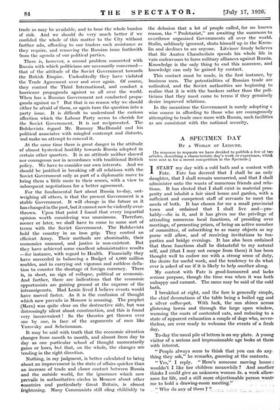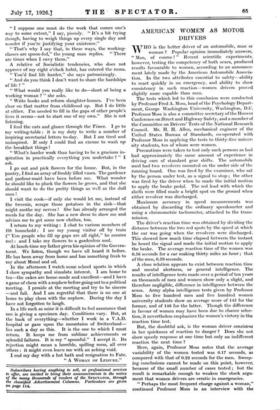A SPECIMEN DAY
BY A WOMAN OF LEISURE.
[In response to requests we have decided to publish a few of two articles, describing a characteristic day's work or experience, whick were sent in for a recent competition in the Spectator.] 1 START my day with a cold bath and a contest with -a- Fate. Fate has decreed that I shall be an only daughter, that I shall remain unmarried, and that I shall administer unto the wants of numerous friends and rela- tions. It has elected that I shall exist in material pros- perity and inhabit a fair sized house and garden, with a sufficient and competent staff of servants to meet the needs of both. It has chosen for me a small provincial town and ordained that I shall live and—pro- bably—die in it, and it has given me the privilege of attending numerous local functions, of presiding over meetings, of presenting prizes, of being an active member of committee, of subscribing to as many objects as my purse will allow, and of receiving invitations to tea- parties and bridge evenings. It has also been ordained that these functions shall be distasteful to my natural self, and (that I may not escape from them) it has been thought well to endow me with a strong sense of duty, the desire for useful work, and the tendency to do what ever is asked of me if it is likely to help another along.
My contest with Fate is good-humoured and lacks serious purpose, though the time was when it was both unhappy and earnest. The same may be said of the cold bath.
I breakfast at eight, and the fare is generally simple, the chief decorations of the table being a boiled egg and a silver coffee-pot. With luck, the sun shines across glistening lawns and through the large open window, warming the coats of contented cats, and reducing to a state of apparent exhaustion a couple of dogs who, never- theless, are ever ready to welcome the events of a fresh day.
To-day the usual pile of letters is on my plate. A young visitor of a serious and impressionable age looks at them with interest.
" People always seem to think that you can do any- thing they ask," he remarks, guessing at the contents.
" Yes," I reply. "Here's someone moving house : wouldn't I like her children meanwhile ? And another thinks I could give an unknown woman 5s. a week allow- ance for life, and a still more objectionable person wants a me to hold drawing-room meeting."' . .
_ " Why do any of them ? " I suppose one must do the work that comes one's way to some extent," I say, piously. " It's a bit trying though, having to weigh things up every single day and wonder if you're justifying your existence."
" That's why I say that, in these ways, the working- classes are spoon-fed," the young man replies. " There are times when I envy them."
A relative of Socialistic tendencies, who does not approve of my eight o'clock habit, has entered the room. " You'd find life harder," she says patronizingly.
" And do you think I don't want to share the hardships of life ? "
" What would you really like to do—short of being a working woman ? " she asks.
" Write books and reform slaughter-houses. I've been clear on that matter from childhood up. But I do little at either. I'm needed to fill in the gaps of other people's lives it seems—not to start one of my own." She is not listening.
I feed the cats and glance through the Times. I go to my writing-table : it is my duty to write a number of inspiring secretarial letters to-day. But I am tired and uninspired. If only I could find an excuse to wash up the breakfast things . " What's harder work than having to be a gracious in- Ipiration in practically everything you undertake ? " I ask.
I go out and pick flowers for the house. But, in the pantry, I find an array of freshly filled vases. The gardener and parlour-maid have been before me. What wonder he should like to pluck the flowers he grows, and that she should want to do the pretty things as well as the dull ones !
I visit the cook—if only she would let me, instead of the tweenie, scrape those potatoes in the sink—that might soothe my nerves ! She has already arranged the meals for the day. She has a new dress to show me and advises me to get some new clothes, too.
I return to my writing : I chat to various members of tat household : I see my young visitor off by train (" You people who fill up gaps are all right," he assures me) : and I take my flowers to a gardenless soul.
At lunch-time my father gives his opinion of the Govern- ment. We listen, though we have • all heard it before. He has been away from home and has something fresh to say about Mosul and oil.
In the afternoon I watch some school sports in which I show sympathy and simulate interest. I am home to tea—the cakes are home-made and excellent—and I have a game of chess with a nephew before going out to a political meeting. I preside at the meeting and try to be sincere —and fail. And I am regretful that there is no one at home to play chess with the nephew. During the day I have not forgotten to laugh.
In a life such as mine it is difficult to feel assurance that one is giving a specimen day. Conditions vary. But, at the back of everything—whether I work in a V.A.D. hospital or gaze upon the mountains of Switzerland— lies sueh a day as this. It is the one to which I must return. It keeps me from sublime achievements or splendid failures. It is my " spoonful." I accept it. Its rejection might mean a horrible, spilling mess, all over others : it might even leave me with an aching void.
I end my day with a hot bath and resignation to Fate. " A WOMAN OF LEISURE."











































 Previous page
Previous page